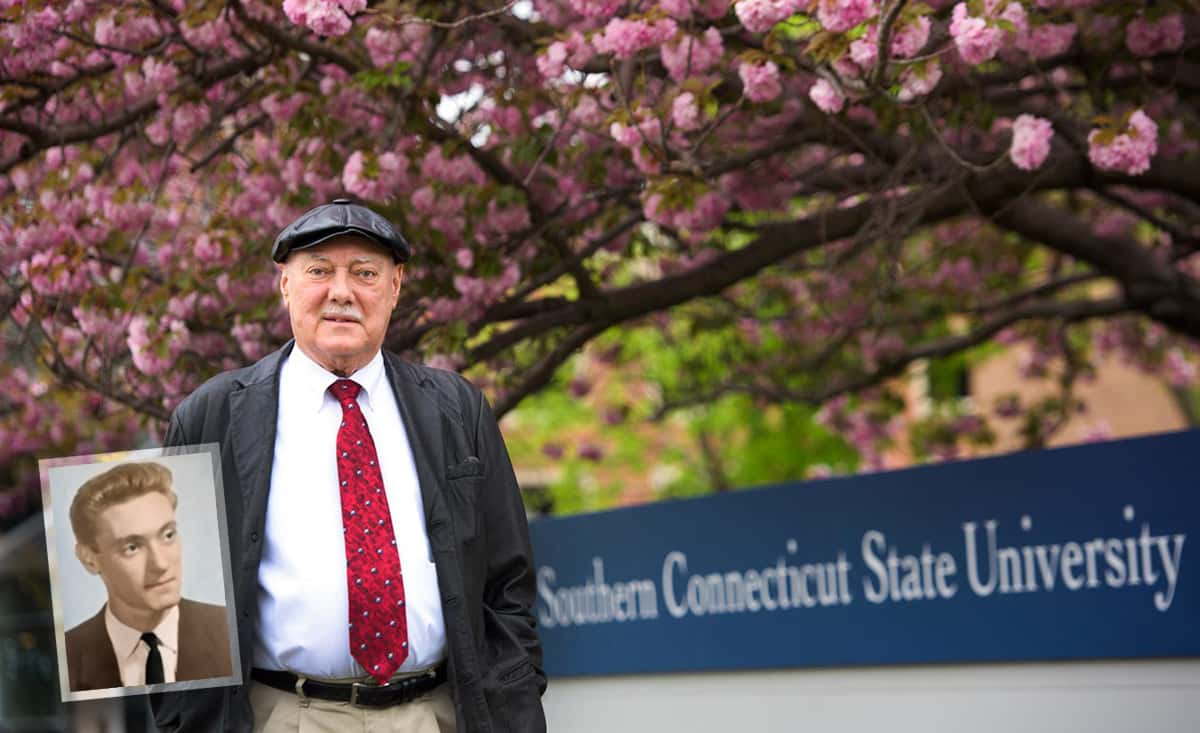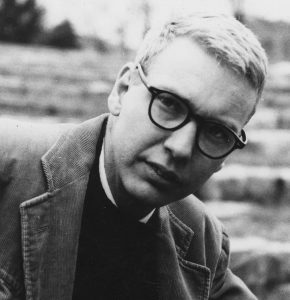Back when Bill Conlon was an undergraduate at Southern in the early 1960s, he happened to know Walter Tevis, who was teaching creative writing at Southern at the time and later went on to write the novel The Queen’s Gambit, upon which the wildly popular Netflix miniseries is based. Based on Tevis’ 1983 novel of the same name, The Queen’s Gambit is a coming-of-age drama created for Netflix in 2020. Tevis also wrote The Hustler, which was made into a movie starring Paul Newman and Jackie Gleason; The Color of Money, which was made into a film starring Newman and Tom Cruise; and The Man Who Fell to Earth, which also was made into a film, starring David Bowie.
But when Conlon knew Tevis, he was a writing teacher and “a superb storyteller.” Conlon is himself a storyteller, and is now a graduate student in the English Department‘s MFA in creative writing program. Here Conlon shares his own story about his early years at Southern and his friendship with Tevis.
Tell me a bit about yourself. Where did you grow up? Have you lived in the New Haven area your whole life?
I was born at Griffin Hospital in Derby, Conn., on July 8, 1942. The oldest of six siblings, I attended St. Mary’s School and graduated in 1956 with the English prize. I spent three years at St. Thomas Seminary in Bloomfield, Conn., and graduated with honors from Derby High School in 1960.
What was it like to be an undergraduate at Southern in the early 1960s?
I started my studies at Southern Connecticut State College in the fall of 1960. In May 1963, I married and moved to New Haven where I worked, 3-11, at the Hospital of St. Raphael since the summer of 1960. Marriage, employment, and fatherhood impacted my involvement at Southern, scholastically and socially. After SC² became SCSU, I transferred to the class of 1965 to enroll in the B.A. program and escape student teaching. Unfortunately, low grades prevented my graduating, and I didn’t earn my B.A. until 2016.
In what ways is it different to be a graduate student at Southern in 2020?
I am presently retired from the work force and enrolled in the MFA program in creative writing. Devoting adequate time to my studies allows me to appreciate the admirable faculty of Southern’s English Department. I earn the grades that I dreamed of as an undergraduate. I also have time to partake of activities like answering this questionnaire.
I understand that you knew Walter Tevis, who wrote the book The Queen’s Gambit, on which the popular miniseries is based. Tevis taught creative writing at Southern when you were an undergraduate student here. How did you know him, and what was he like?
When Walter Tevis taught at Southern, he was well known as the author of The Hustler. I was never in his class. We did meet and chat on a number of occasions. We lived equidistant from the Yale Bowl Café on Derby Ave. Passing the café on my way home from work, I would look through the window to see if Mr. Tevis was at the bar. I would then check my pockets for a spare half dollar for a couple draft beers and join him. Mr. Tevis was an affable gentleman and a superb storyteller. He enjoyed talking about the pool room he ran, off campus, at the University of Kentucky where he majored in English. He said that the fixes that got the entire UK basketball team banned from the NCAA took place in his poolroom. He later wrote the science fiction novel, The Man Who Fell to Earth. He also talked about making the movie of The Hustler, his role as technical advisor, and hobnobbing with the movie stars. He spoke of being at the home of George C. Scott and Colleen Dewhurst when Liz Taylor and Richard Burton dropped in for cocktails. He suggested that I take his class, but I couldn’t envision finding time to write.
What made you want to enter Southern’s MFA program? Have you always been a writer? Where are you in the program, and what kind of writing do you do?
After finally earning my degree, I took advantage of the generous CSCU program for senior citizens and continued taking courses. I took introductory courses in creative writing because I had often dreamed of writing as I am sure most avid readers sometimes do. My excellent teacher, Jason Labbe, encouraged me to apply for the MFA program. Before taking Jason’s classes, I had never written anything other than school assignments except for a one-page story when I was in second grade. I applied to the program, and I was accepted. Presently, I am about halfway through the 48-credit program. My major is fiction writing. I have been writing mostly stories about after-hours night life in the 1970s. During these past two semesters, I have explored a burgeoning interest in writing poetry.
How are virtual writing classes going?
The virtual writing workshops have gone remarkably well. One misses the camaraderie that is part of the workshop experience, but I believe my writing has improved as it would have in the classroom environment.
Do you have any advice for aspiring writers?
I would advise any aspiring writer to take beginning courses in creative writing to ground oneself in the techniques of craft. Then write and continue writing and write some more.



